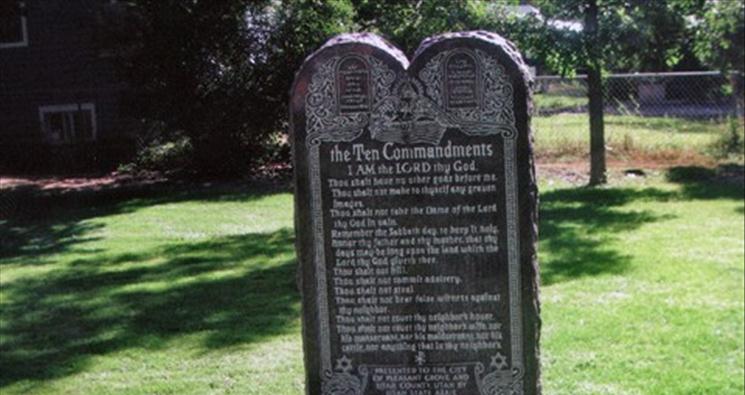Another Win in Latest Chapter of Ten Commandments Challenge
As you may recall, over three years ago, in Pleasant Grove City v. Summum, the ACLJ obtained a unanimous victory before the United States Supreme Court which allowed the City of Pleasant Grove, Utah to continue to display a donated Ten Commandments monument in a public park alongside other historically relevant items without being legally required to accept and display all items that any private group or individual offers to donate. Litigation against Pleasant Grove has continued in state court, however, and today Utah District Court Judge Robert Howard granted our motion for summary judgment and ruled that Pleasant Grove’s display of the Ten Commandments monument in the City’s Pioneer Park does not require the City to accept and permanently display any and all items offered for donation, including the “Seven Aphorisms” of Summum.
These lawsuits were brought by Summum, a religious organization based in Salt Lake City, Utah, because the city declined to accept and display Summum’s “Seven Aphorisms” monument alongside a Ten Commandments monument that the city had accepted from the Fraternal Order of Eagles. The Supreme Court rejected Summum’s First Amendment free speech argument, concluding that when it comes to displaying monuments on public lands — a historical practice of governments since time immemorial — the government is the speaker and has the right to “speak for itself,” “say what it wishes,” and “select the views it wants to express.”
After the U.S. Supreme Court rejected its free speech claim, Summum amended its complaint and argued instead that Pleasant Grove had violated the federal Establishment Clause. The U.S. District Court in Utah dismissed Summum’s newly minted claim, writing that “there is no evidence that anyone in Pleasant Grove government had any idea what Summum’s religious beliefs were, and thus it cannot be said that the Pleasant Grove government demonstrated a preference for one religion over another.”
As we explained last year, having exhausted all federal claims in federal court, Summum turned to Utah state court and filed another lawsuit against Pleasant Grove. Summum claimed that Pleasant Grove had violated Article I, Section 4 of the Utah Constitution, which states that “[n]o public money or property shall be appropriated for or applied to any religious worship, exercise or instruction.” Since Utah courts interpret this provision independently of how federal courts interpret the federal Establishment Clause, Summum sought to have a third bite at the apple.
Each side filed multiple briefs from September of last year through March of this year, and Judge Howard held a two hour hearing on May 15. The key issues are whether a Ten Commandments monument may have secular, historical meaning when included as part of a secular, historical display and whether the City had created some form of equal access rights for any and all potential donors by choosing to accept and permanently display some items in its city parks while declining to accept and display others.
In a decision issued today, Judge Howard granted our motion for summary judgment and denied Summum’s motion for summary judgment, rejecting Summum’s key arguments. His opinion explained that “[a] portrayal of the Ten Commandments . . . may be an expression of one or many ideas, ranging from artistic to historical, some of which could be considered religious, but many of which would not.”
In addition, he stated, “as argued by Defendants, . . . there can be no discrimination against private users when there is no private use. . . . This is not a situation in which the City has opened up the Park for private entities to erect monuments in expression of their private speech.” Judge Howard also concluded, “[t]he benefit described by Plaintiff . . . of one group being allowed to erect a monument while another group is denied the same privilege, simply does not exist.”
Summum will most likely appeal this decision to the Utah Court of Appeals, and the case may eventually reach the Utah Supreme Court. The implications of the final decision in this case, however, will reach all fifty states. Although the current litigation is based on the Utah Constitution, state courts often look to the decisions of other state courts who have addressed similar constitutional issues. A decision in Summum’s favor in this litigation could pave the way for similar suits around the country seeking to force states, counties, cities, and towns to accept and permanently display all sorts of items on public property alongside veterans memorials or Ten Commandments monuments.
Also, the implications of this litigation go far beyond permanent displays of the Ten Commandments. For example, our most recent brief explained:
The Battle Hymn of the Republic, written as a hymn during the Civil War, has since attained popularity as a secular, patriotic song. The final stanza states:
In the beauty of the lilies Christ was born across the sea,
With a glory in his bosom that transfigures you and me:
As he died to make men holy, let us die to make men free,
While God is marching on.
Under Plaintiff’s theory, if the State of Utah added the lyrics of this song to a Civil War memorial, it would be required to accept and permanently display any and all secular or religious items offered by any group or individual, regardless of whether they relate to the Civil War.
Similarly, the opinion from the United States Supreme Court noted that, under Summum’s view of the law, “when France presented the Statue of Liberty to the United States in 1884, this country had the option of either (1) declining France’s offer or (2) accepting the gift, but providing a comparable location in the harbor of New York for other statues of a similar size and nature (e.g., a Statue of Autocracy, if one had been offered by, say, the German Empire or Imperial Russia).”
We will update you as this litigation moves forward.
